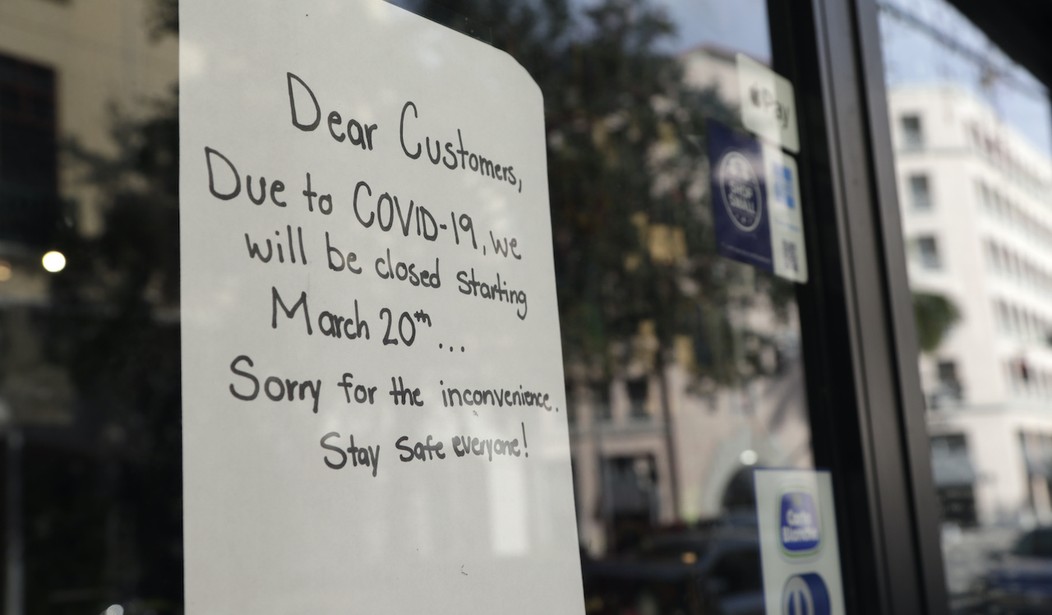(The opinions expressed in guest op-eds are those of the writer and do not necessarily represent the views of RedState.com.)
Government programs rarely work as intended. Even if they’re not plagued by waste and bureaucracy, they often produce unintended consequences and tend to get exploited by — or are designed for — special interests.
So when Congress created a massive new stimulus program overnight as part of the CARES Act in March 2020, there were bound to be problems.
The Paycheck Protection Program (PPP) was intended to provide forgivable loans to small businesses struggling to survive the government-imposed COVID-19 lockdowns. As long as the recipient used the funds for their intended purpose —generally, keeping employees on payroll — loans could later be forgiven. So far, so good.
But subsequent research estimated that, while the $800 billion PPP likely saved 2-3 million jobs, it was poorly targeted, with as little as a quarter of the funds reaching “workers who would otherwise have lost jobs.” Other research determined that “PPP payments mostly benefited those least in need.” Wasteful and inefficient? Check.
Further, as even President Biden has admitted, the federal government’s COVID-19 stimulus spending, of which the PPP was a part, has played a big role in the inflation currently dominating headlines. Unintended consequences? Check.
And, to top it off, a recent Freedom Foundation report documents how as many as 226 forgivable loans totaling $36.7 million were provided to labor unions and related organizations that were apparently ineligible for the funds.
Business entities of all kinds initially qualified for the PPP, as did 501(c)(3) charitable nonprofits. However, from March 2020 to March 2021 — when the newly-Democrat Congress passed President Biden’s American Rescue Plan — most other kinds of tax-exempt organizations, including labor unions, were not eligible for PPP funds.
Some of the more noteworthy recipients during this period included a dozen teachers’ unions and advocacy organizations, who unabashedly worked to exploit the pandemic for their own benefit wherever possible and resisted a return to normalcy in American public schools as long as they could.
Nearly a dozen unions representing other government employees at the state and municipal level also received PPP funds for which they were apparently ineligible.
And five AFL-CIO entities — the AFL-CIO is essentially a trade association for unions — received nearly a half-million dollars in loans between them.
All of these groups tend to be very active in elections, and it is entirely possible that the PPP loans freed up other funds for politicking.
From a policy standpoint, it’s tough to argue unions needed the funds. In addition to the PPP funds received by private employers to maintain payroll, the federal government provided hundreds of billions of dollars to states, local governments, and school districts, much of which went to keeping people employed and, if unionized, paying dues.
So far, unions haven’t been too eager to talk about their receipt of PPP loans.
A spokesman for the American Federation of State, County and Municipal Employees (AFSCME), one of the country’s largest government unions, “deflected questions about the wrongdoing” when asked by the Epoch Times about AFSCME affiliates receiving funds for which they were ineligible. And the head of the Ohio Retired Teachers Association told the Daily Signal simply that, “We applied, and they gave it to us, and we were happy for it.”
This isn’t surprising. At minimum, unions seeking PPP loans would have falsely attested to their eligibility on the application form, and potentially included other incorrect information. If done intentionally, such misrepresentations could involve significant — even criminal — penalties.
But the government shares part of the responsibility for failing to prevent the inappropriate loans.
While the Small Business Administration (SBA) administered the PPP, it contracted with a network of thousands of private financial institutions around the country to actually process and approve loan applications. Obviously, quite a few dropped the ball when it came to thoroughly reviewing union applications.
In one particularly egregious case, the Bank of Labor — owned by the Boilermakers Union — approved a quarter-million-dollar loan to a Boilermakers affiliate.
Records obtained under the Freedom of Information Act show that SBA officials were alerted by White House staff as early as July 2020 that unions appeared to be getting PPP loans for which they were ineligible, but the SBA does not appear to have taken any action to address the matter. Unions continued to receive loans they weren’t eligible for, and some even received second loans. So far, according to SBA data, at least $24.2 million of the problematic loans identified by the Freedom Foundation have been forgiven.
But it’s not too late to undo some of the damage. The Freedom Foundation submitted its findings to the SBA’s Inspector General, who has previously identified other flaws in the SBA’s handling of the PPP, and to the Department of Justice’s National Center for Disaster Fraud.
If federal authorities do the right thing — which is admittedly a lot to ask for these days, especially from an administration so enthralled with unions — they’ll at least try to recover the funds on behalf of American taxpayers.
Maxford Nelsen is Director of Labor Policy at the Freedom Foundation. Download the full SBA loan recipient spreadsheet at www.FreedomFoundation.com.













Join the conversation as a VIP Member